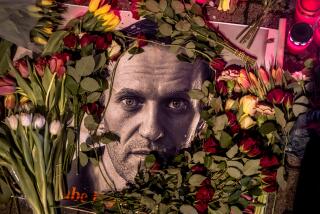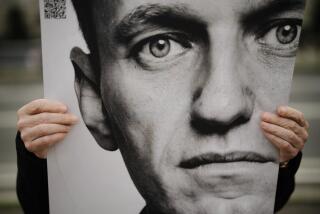Soviets Brand Brezhnev as the Successor to Stalin
- Share via
MOSCOW — Leonid I. Brezhnev, who for 18 years led the Soviet Union, came under harsh attack here Friday as vain, corrupt and inept, a power-hungry, morally weak man without political vision and ideologically a successor to the late dictator Josef Stalin.
Declaring that Brezhnev’s mistakes will take years to correct and can never be forgiven, Soviet historians, political commentators, foreign policy analysts and Communist Party officials condemned him in unprecedented terms and with unremitting severity in a full media assault on a man once hailed here as a “second Lenin.”
Brezhnev’s long tenure as the Communist Party’s general secretary has been denounced for the last two years as “the period of stagnation,” and his name has been removed from dozens of towns, factories, schools, streets, parks and other places that had been named in his honor.
But the new attacks go much further, and they are striking in their bitter portrayal of Brezhnev, who died in 1982, as incompetent, venal and a threat to the nation’s security and prosperity.
The point of the attacks, clearly, is to discredit Brezhnev, his leadership and his policies in advance of the special party conference that Mikhail S. Gorbachev, the present general secretary, will convene here this week to broaden and accelerate his program of political, economic and social reforms.
Facing strong opposition throughout the party and government bureaucracy, Gorbachev is reminding the 5,000 conference delegates and the 20 million party members nationwide of how bureaucrats amassed so much power under Brezhnev, of what they have done with it and of what they stand for today.
The focus of the conference will be Gorbachev’s proposal for a complete overhaul of the political system to end the Communist Party’s monopoly on power and shift much responsibility to state bodies. Other groups, such as environmentalists, would be allowed to play much larger roles in the future.
A Step Backward
The economic reforms, party officials say, will be a sharp step backward from central planning toward individual enterprise and market forces.
Any critic of these sweeping reforms, who might simply be cautioning that they reach too far and are going too fast, thus risks being labeled a “Brezhnevite” and being forced out of party meetings and groups as liberals consolidate their hold.
They are also likely to find themselves characterized, along with Brezhnev, as proponents of Soviet military intervention in Afghanistan--at a time when Moscow fears that it cannot get its troops out fast enough.
Pyotr Shelest, the Communist Party leader in the Ukraine from 1963 until he was ousted by Brezhnev in 1972, recounted in a newspaper interview last week how Brezhnev, aided by the late Mikhail Suslov, then the party’s ideology chief, managed to depose Nikita S. Khrushchev in 1964. The two men apparently orchestrated every move, down to cues on when to interrupt a speaker, at the meeting of the party Central Committee that elected Brezhnev.
Desire for Power
Brezhnev and Suslov then did all they could “to ensure the continuation of the bureaucratic command system of government developed under Stalin,” Shelest said. He described the two as driven largely by a desire for power rather than wanting to speed the country’s development or even correct what they called Khrushchev’s “hare-brained schemes.”
Stanislav Kondrashev, a political commentator for the government newspaper Izvestia, recalled last week how a Brezhnev ally, Viktor Grishin, then head of the Moscow party organization, had opposed Gorbachev for the leadership three years ago but lost decisively.
Had Grishin won that Central Committee election, Kondrashev speculates, perestroika (restructuring) would probably never have been undertaken and the “period of stagnation” would have continued and deepened.
Shelest also recalled how Brezhnev demanded the nation’s top honor, Hero of the Soviet Union, for his 60th birthday in 1966, though this award is usually reserved for war heroes or cosmonauts. He got it--and on two later occasions as well--and amassed a chestful of other medals.
Last Years Were Worst
Brezhnev’s last years were the worst, commentator Alexander Bovin writes in a just-published book promoting Gorbachev’s reforms. Well before his death, “Brezhnev began to collapse and fall apart as a personality and a politician,” Bovin asserts. “He totally lost any self-critical control over his actions, and he believed completely in his own greatness.”
Bovin contends that Brezhnev had always been “a man of the (party) apparatus, and in fact a servant of the apparatus,” the bureaucracy whose power Gorbachev is trying to break.
Perhaps the most devastating portrayal of Brezhnev came in a special prime-time television series on the background to Gorbachev’s reforms that describes the Soviet military intervention in Afghanistan as Brezhnev’s war.
He is shown repeatedly in the dress uniform of a marshal of the Soviet army, his tunic heavy with medals, intercut with film shot on the battlefront in Afghanistan where Soviet soldiers are being killed and other film showing wounded soldiers at a veterans hospital in Volgograd.
Futility of War
As a balladeer sings a mournful song with the refrain, “And so goes the war,” the wounded talk about the futility of the Afghan conflict, and war in general, while Brezhnev’s portrait as a Soviet marshal is shown.
The series also suggests that Brezhnev was personally responsible for the imprisonment and death of a prominent agricultural economist who was jailed in the early 1970s as a threat to state security for his then-unconventional views on family farming.
“The name of Brezhnev will never be respected,” a political scientist with the Gorky Institute said last week in another national newspaper article. Although he claimed to be following in the footsteps of V. I. Lenin, the Bolshevik revolutionary who founded the Soviet state, his policies were “much closer to Stalinism,” the professor, G. Kunitsyn, said.
Nikolai Kapchenko, the editor of the foreign affairs journal International Life, says in the latest issue that under Brezhnev the Soviet Union “went through a period of national abasement” as an already incompentent leader became the object of an “orgy of glorification . . . and bootlicking flourished.”
Sought Parity With U.S.
A party historian, Oleg Obichkin, also writing in International Life, contends that “realism and common sense were lost” when the Soviet Union sought strategic parity with the United States and its allies in armaments during the 1970s.
The country simply could not afford to match the richer West gun for gun and missile for missile, according to Obichkin, but Brezhnev made it the keystone of Soviet policy.
Other articles have portrayed Brezhnev as accepting carloads of presents from political subordinates and tolerating even worse corruption at lower levels while the Soviet economy sank into a deep crisis from which it has yet to recover.
“Such phenomena as bribery, speculation and theft existed before Brezhnev, but under him they really flourished,” a deputy public prosecutor, Alexander Katusev, commented last week.
Probes Were Halted
Although in the past any investigation that came close to Brezhnev, his family or friends was immediately halted, Katusev said that Brezhnev’s son-in-law, Yuri Curbanov, would be tried shortly on corruption charges.
A two-story white marble mansion built for Brezhnev in Baku, the Azerbaijani capital, was turned over amid considerable fanfare to the local government there last week for use as a “wedding palace.”
Constructed for a 1982 Brezhnev visit, the mansion was used for two days during the visit--and has not been used since. The Azerbaijani legislature, under pressure from Moscow, voted last week to let the building be used by the public as a matter of “social fairness.”
More to Read
Sign up for Essential California
The most important California stories and recommendations in your inbox every morning.
You may occasionally receive promotional content from the Los Angeles Times.













